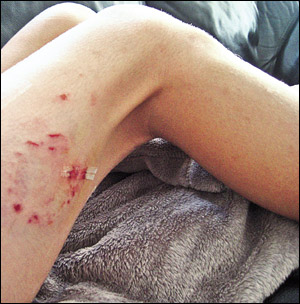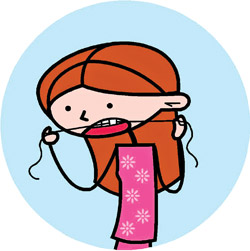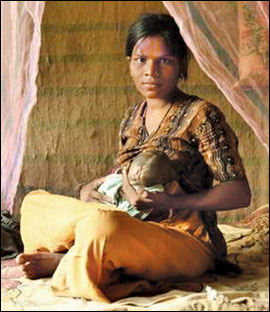|
HEALTH WATCH
Rabies - 100 percent fatal! 100 percent preventable!
Nadira Gunatilleke
Do you like dogs ? May be you are a dog owner. May be you hate
dogs...and all the other animals. But still you are at risk of getting
infected with rabies. No matter who you are or what you do. At least few
instances in your life you have to get down from your vehicle and walk
in local streets. May be you have to walk at night. This is why you are
at risk and need to be aware of rabies. It will save your life and the
lives of your loved ones, especially your children.
Rabies is 100 percent fatal and 100 percent preventable. Annually 55
persons die from rabies in Sri Lanka and half of them are bellow the age
of 15. That means many of the victims are children. This number was 377
in 1977. Around 109 persons died from rabies in 2000. The most affected
districts are Colombo, Gampaha, Galle, Baticaloa, Anuradhapura and
Jaffna. Not even a single rabies case reported from districts such as
Hambantota and Polonnaruwa.
|

A rabies infected dog. |
|
What WHO says about rabies
|
* Wound
cleansing and immunizations, done as soon as possible after
suspect contact with an animal and following WHO
recommendations, can prevent the onset of rabies in virtually
100% of exposures. Recommended treatment to prevent rabies
depends on the category of the contact:
* Category I: touching or feeding suspect animals, but skin is
intact
* Category II: minor scratches without bleeding from contact, or
licks on broken skin
* Category III: one or more bites, scratches, licks on broken
skin, or other contact that breaks the skin; or exposure to bats
* Post-exposure care to prevent rabies includes cleaning and
disinfecting a wound, or point of contact, and then
administering anti-rabies immunizations as soon as possible.
Anti-rabies vaccine is given for Category II and III exposures.
Anti-rabies immunoglobin, or antibody, should be given for
Category III contact, or to people with weaker immune systems.
|
Rabies can spread mainly through dogs and the percentage is 82. It
can spread through cats (5 percent). It can spread through other wild
animals (2 percent).
Any warm-blooded animal (including humans) may become infected with
the rabies virus and develop symptoms. Natural transmission has only
been documented among mammals. Most animals can be infected by the virus
and can transmit the disease to humans. Infected bats, monkeys,
raccoons, foxes, skunks, cattle, wolves, coyotes, mongoose (normally
yellow mongoose) or cats present the greatest risk to humans. Rabies may
also spread through exposure to infected domestic farm animals,
groundhogs, weasels, bears and other wild carnivores. Rodents (mice,
squirrels etc) are seldom infected.
Treatment after exposure is highly successful in preventing the
disease if administered promptly, generally within ten days of
infection. But it is better to take action as soon as possible.
Thoroughly washing the wound as soon as possible with soap and water for
approximately ten minutes is very effective at reducing the number of
viral particles.
Whenever a dog bites, the wound should be washed very well with soap
for about ten minutes and medical treatment should seek as soon as
possible and the details of the dog should be provided to the doctor at
the same time.
Post-exposure treatment should start right away and only be stopped
if the animal is a dog or cat and remains healthy after 10 days. Animals
that are sacrificed or have died should be tested for the virus, with
results sent to responsible veterinary services and public health
officials.
The incubation period for rabies is three weeks to three months. The
period between infection and the first flu like symptoms is normally two
to twelve weeks, but can be as long as two years.
Soon after, the symptoms expand to slight or partial paralysis,
cerebral dysfunction, anxiety, insomnia, confusion, agitation, abnormal
behavior, paranoia, terror, hallucination, progressing to delirium.
|

A victim who was bitten by a rabies infected dog |
The production of large quantities of saliva and tears coupled with
an inability to speak or swallow are typical during the later stages of
the disease; this can result in hydrophobia, in which the patient has
difficulty swallowing because the throat and jaw become slowly
paralyzed, shows panic when presented with liquids to drink, and cannot
quench his or her thirst. Death almost invariably results two to ten
days after the first symptoms.
According to Healthcare and Nutrition Ministry, the Sri Lankan
Government compelled to spend Rs.35000 every time a dog bites a person.
Annually over 50 persons dies in Sri Lanka by rabies. People die from
rabies because of negligence.
The ministry spends Rs. 500 million to treat dog bites. Annually
there are 400,000 dog bites reported from Sri Lanka.
The ministry runs 25 Rabies Control Units countrywide. Another 200
state hospitals of the country offer free care and treatment for the
public and domestic doges including anti rabies injection. The ministry
kindly request the public to be responsible dog owners and act promptly
and in a responsible manner when a domestic or stray dog bites a human
being.
Till 2005, dog population was controlled by destroying them but in
2005 the Government took a policy decision not to destroy dogs. But the
main responsibility is with the community.
It is being a responsible dog owner and taking prompt action as soon
as a dog bites a person.
Sri Lanka Dental Association:
Hosts 32nd APDC
The 32nd Asia Pacific Dental Congress (APDC) - the annual scientific
meeting will be held in Sri Lanka from May 12th to 16th hosted by the
Sri Lanka Dental Association.
Considered as one of the largest dental conferences in the world, the
APDC, which will be held for the second time in Sri Lanka, has been
recognized by the Government of Sri Lanka as a National event, is
sponsored by Unilever Sri Lanka’s oral care brand Signal.
The theme for this year will be “Clinical Excellence in Dentistry
through Evidence, Knowledge and Technology” - an attractive academic
program, which has been organized targeting mainly the general dental
practitioners and covering broader topics of dental implantology,
ceramics, aesthetic dentistry, periodontology, endodontic, oral diseases
and minor oral surgery.
|

Flossing your teeth |
More than 35 world renowned experts in the field of dentistry will be
joining the local experts in conducting lectures, symposiums and
hands-on workshops during these 5 conference days.
“The program is designed to have a direct clinical impact on the day
to day clinical practice of the dental professionals in Sri Lanka and in
the Asia Pacific Region”, Chairman of the Organizing Committee,
Professor Prasad Amaratunga said. Prof. Prasad the current President
Elect will also take on the office of President of the Asia Pacific
Dental Federation at the APDC, thereby committing to lead the way for
the Dental profession in the Asia Pacific region.
The Dental Trade Exhibition with participation of 100 Dental
Manufacturers and dealers from various parts of the world would
undoubtedly bring in the desired new technology to Sri Lanka.
Though only open for Dental Professionals, this trade exhibition
would also provide an opportunity for Dental Surgeons to buy the latest
dental machinery, equipment, hand instruments and dental materials etc.
to enhance their professions.
“It is indeed a challenge and a great responsibility to organize and
manage, perhaps one of the largest dental congresses in the world”,
President of the Sri Lanka Dental Association Dr. Farhim Jameel said.
“The 32nd APDC Congress will be a great opportunity for Dental
professionals from around the world to share the most up-to-date
information regarding the scientific advances in Dentistry. More than
1,000 participants are expected; and we invite all professionals in the
field to join us in this unique scientific and cultural experience”, Dr.
Jameel said
Ramani Samarasundera, Marketing Director - Personal Care of Unilever
Sri Lanka said that, “Signal has always been committed to promoting good
oral health through its product formats as well as its community
programs.
The APDC 2010 will be a strong platform for the Dental fraternity of
Sri Lanka to develop the Oral Health Industry in the country and we are
indeed proud to be a part of this effort.”
The APDF is a dental professional organization, currently with 27
member associations from 27 countries and this annual academic congress
is hosted by one of the member associations every year. Spanning over 5
days, the event will be held at the Bandaranaike Memorial International
Convention Hall in Colombo.
Emerging trends in paediatric nutrition
Ganga Illeperuma
Breastfeeding can be enjoyable for both the mother and baby. Proper
nutrition in childhood can reinforce lifelong eating habits that
contribute to your children’s overall well-being and help them to grow
up to their full potential and a healthy life.
|

A mother breastfeeding her baby |
A healthy eating plan that you can use to help your kids reach the
food pyramid goals and recommendations for breastfeeding, eating fruits,
vegetables, whole grains, fish and meats.
Most nutrition experts recommend against forcing kids to eat foods
they don’t like or making them ‘clean’ their plates. So how do you give
them breastfeeding and complementary food? How do you avoid mealtime
battles in your home? How do you get your kids to eat healthy foods?
Nestle Nutrition Institute organized a seminar for doctors who work
in Colombo, Kandy and Galle recently and the seminar was conducted by
Prof. Berthold Koletzko and Prof. Sibylle Koletzko.
For more than 60 years, Nestle has contributed to the continuing
nutrition education of health professionals. The formation of the Nestle
Nutrition Institute formalizes this long-standing commitment at a global
level.
For newborn baby breastfeeding is the best food specially till even
six months. Breastfeed is effect for long term health and it has more
power to resist allergies. But the problem is now a days mothers are
very busy with their work places and they have to go their office after
4 months from delivery. “A mother can pump her milk to the milk bottle
and keep it in the refrigerate but before three or four hours you have
to give it to the baby. You do not give cow milk for your baby instead
of breastfeeding. Sometimes cow milk is risky because it is a cause for
some allergies, vomit, stomach ache or asthma,Professor of paediatrics
Sibylle Koletzko said.
Possible
nutritional approaches
for primary prevention |
* Maternal
exclusion diet during pregnancy and lactation
* Breastfeeding
* Delayed introduction of solid foods to infant
* Soy or hypoallergenic infant formula
* Supplementary feeding |
|
Maternal diet
during breast-feeding |
*
Recommended: balanced and nutritional complete diet during
pregnancy and breast-feeding
* No evidence for dietary restrictions (avoidance of potential
food-allergens) during pregnancy and breast feeding
* Some evidence for protective effect of fish consumption during
pregnancy and breast-feeding for development of atopic diseases
in offspring |
Because of the complicated life of mothers in their workplaces they
can add some complementary food to their baby’s menu but too much sugar
is not good for their dental health. When you give complementary food
you have to give your attention specially for iron, vitamin A and D.
Ocean fish and meat are good complementary food for babies. It helps to
continue a good immunity system”, Prof. Berthold Koletzko said.
Does breast-feeding reduces the risk
for allergy?
Very conflicting data whether any, prolonged or exclusive
breast-feeding reduces the risk for allergic diseases. Evidence mostly
from observational studies, (reverse causality is likely).
Breastfeeding
There are many good reasons to promote exclusive and partial
breastfeeding during the first half year of life. The available
knowlegde does not support the evidence that prolonged or exclusive
breastfeeding reduces the risk for atopic dermatitis, asthma or allergic
rhinitis.
Feeding recommendations in the
intervention group
- Breastfeeding for at least 4, better 6 months. Feeding the
randomised study formula as only supplement for breastfeeding during
intervention period of 4 months. No solids within the first 4 months.
Thereafter, only one new solid food per week. No potentially allergenic
foods as whole cow’s milk and diary products, hen eggs, fish, nuts and
citrus during the first year of life.
Formula feeding
Soy formula has no allergy preventive effect, not recommended.
Certain hydrolysed formulae reduce the risk for atopic dermatitis and
cow’s milk protein allergy in high risk patients.
Effect develops in 1st year and persists until 6 years. No effect on
asthma. No effect on allergic rhinitis.
Solid food introduction
Very early solid food introduction (3 to 4 months of life) with a
high variety of different foods may increase the risk of allergic
diseases (eczema).
Delaying the introduction of solids food beyond the 6th months of
life has no protective effect or may be even increase the risk for
allergy. This also applies to allergenic foods like hen’s egg, cow’s
milk, fish, wheat.
Burden of AIDS hits Zimbabwe’s women hardest
Since testing positive for HIV six years ago, Cecilia Chinhamo has
endured a torrent of verbal abuse from her husband.
“My husband shouts at me and calls me a walking corpse,” said the
30-year-old Zimbabwean vegetable vendor. “I can only cry when he says
that. What else can I do?”
Like many Zimbabwean women with HIV, Chinhamo battles to convince her
husband to get tested himself or to use a condom, raising fears for the
future of their four-year-old daughter.
“My husband’s problem is he thinks he is fit,” she said. “He refuses
to get tested, insisting he is negative. At times he agrees to use
condoms, but it’s not easy every time.”
AFP
Solve your health problems now!
Dear readers,
The Daily News is ready to answer all your health related problems.
We will forward all your health problems to the qualified doctors in
relevant fields who are attached to the Ministry of Healthcare and
Nutrition, Health Education Bureau and get answers for your problems.
All you have to do is email your problems and queries on health in brief
to [email protected]. Please make your queries short. |



